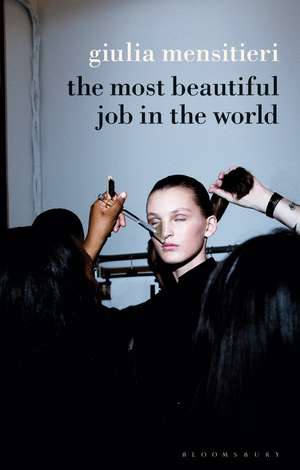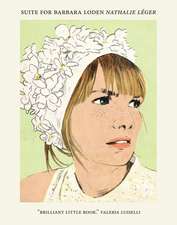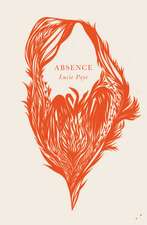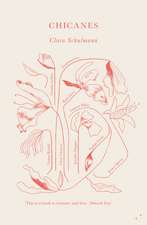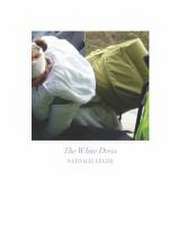The Most Beautiful Job in the World: Lifting the Veil on the Fashion Industry
Autor Giulia Mensitieri Traducere de Natasha Lehreren Limba Engleză Paperback – 5 aug 2020
| Toate formatele și edițiile | Preț | Express |
|---|---|---|
| Paperback (1) | 160.41 lei 3-5 săpt. | +29.30 lei 6-12 zile |
| Bloomsbury Publishing – 5 aug 2020 | 160.41 lei 3-5 săpt. | +29.30 lei 6-12 zile |
| Hardback (1) | 497.56 lei 6-8 săpt. | |
| Bloomsbury Publishing – 5 aug 2020 | 497.56 lei 6-8 săpt. |
Preț: 160.41 lei
Preț vechi: 173.86 lei
-8% Nou
Puncte Express: 241
Preț estimativ în valută:
30.70€ • 32.82$ • 25.59£
30.70€ • 32.82$ • 25.59£
Carte disponibilă
Livrare economică 28 martie-11 aprilie
Livrare express 13-19 martie pentru 39.29 lei
Preluare comenzi: 021 569.72.76
Specificații
ISBN-13: 9781350110168
ISBN-10: 1350110167
Pagini: 288
Dimensiuni: 138 x 216 x 33 mm
Greutate: 0.39 kg
Editura: Bloomsbury Publishing
Colecția Bloomsbury Visual Arts
Locul publicării:London, United Kingdom
ISBN-10: 1350110167
Pagini: 288
Dimensiuni: 138 x 216 x 33 mm
Greutate: 0.39 kg
Editura: Bloomsbury Publishing
Colecția Bloomsbury Visual Arts
Locul publicării:London, United Kingdom
Caracteristici
Exposes the dynamics which keep the exploitation of young creative professionals going - the competitiveness and prestige of the industry and the social status which comes with working in it
Notă biografică
Giulia Mensitieri has a doctorate in social anthropology and ethnology from the École des Hautes Études en Sciences Sociales (EHESS) in Paris, France. Her research focuses on globalisation, the transformations of work, and the coveted imaginary worlds produced by contemporary capitalism.Natasha Lehrer is an award-winning writer and translator. Her writing has appeared in the Guardian, the Times Literary Supplement and The Nation, and elsewhere. She has translated books by Nathalie Léger, Chantal Thomas, Georges Bataille, Robert Desnos, and the Dalai Lama, among others. She won a Rockower award for journalism in 2016, and in 2017 her co-translation (with Cécile Menon) of Suite for Barbara Loden, by Nathalie Léger, won the Scott Moncrieff Translation Prize.
Cuprins
PrefaceFashion and the dreamIntroductionPart I: Fashion and Capitalism: a system for producing the dream1. Fabricating desire: press and advertising2. Haute couture, the apotheosis of the dream3. The circulation of the dream: fashion and globalizationPart II: Working in Fashion or "lucky to be there"4. On the threshold of the dream: the salespeople5. The greater the prestige, the lower the pay: the rules of the game for fashion workers6. Prestige and precariousness: symbolic and material geographies7. At the heart of the dream: the designer-stylistsPart III: The dream and those who work in it8. At work with an up-and-coming fashion designer9. Knowing how to "be there": work relationships10. Getting into fashion, creating a persona, coping in fashion, getting out of fashionConclusion
Recenzii
[The book's] arguments are compelling. Mensitieri skilfully shows how fashion thrives on its own image of inaccessible glamour: not just selling aspirational fantasy via luxury goods, but also taking advantage of those who produce and help to sell these goods by making them feel "lucky to be here" in this world of dream-making.
Mensitieri's book is a meticulously researched ethnographic study of the immaterial production of fashion . Although fashion is its main focus, Mensitieri's book also cleverly turns its critical lens on other fields of supposedly creative endeavour - including academia - where a similarly precarious workforce props up an industry based on constant flexibility, blurred boundaries between work and life, and the promise of a fulfilling career. It is no wonder that it has troubled the French fashion industry. It should.
A fascinating insiders' account of fashion.
Expose[s] a culture of exploitation across the industry.
It's no secret that the fashion world is only beautiful from a distance. [This book] provides substance and critical context to the truism. The findings are rivetingly awful . Mensitieri's academic approach and deeper analysis stop the book from simply being a scathing tell-all or a cheap dig at terrible people who have no self-awareness. The point she makes in her wider analysis can just as easily be applied to most of the jobs across all the arts, media and culture sectors.
Studded with lucid and chilling vignettes that will stick in your memory, Mensitieri's book is a remarkable analysis of how creative capitalism persuades people to work for nothing in the glamor industry, and why their poverty is anything but passionate.
A riveting and revelatory expose, The Most Beautiful Job takes us behind-the-scenes of fashion's phantasmagoria to highlight the precarious, oft-exploited workforce propelling the fashion industry. Mensitieri is a deft researcher, masterful storyteller, and astute critic of contemporary capitalism. Her account is a must-read for anyone interested in the harsh realities of the creative economy.
Marshalling interviews, observations, and history, Mensitieri's portrayal of the underbelly of Parisian fashion labor delivers a devastating critique of the brutal exploitation behind some of the world's biggest fashion houses; this is a bold critique of creative jobs under late capitalism.
Mensitieri's book is a meticulously researched ethnographic study of the immaterial production of fashion . Although fashion is its main focus, Mensitieri's book also cleverly turns its critical lens on other fields of supposedly creative endeavour - including academia - where a similarly precarious workforce props up an industry based on constant flexibility, blurred boundaries between work and life, and the promise of a fulfilling career. It is no wonder that it has troubled the French fashion industry. It should.
A fascinating insiders' account of fashion.
Expose[s] a culture of exploitation across the industry.
It's no secret that the fashion world is only beautiful from a distance. [This book] provides substance and critical context to the truism. The findings are rivetingly awful . Mensitieri's academic approach and deeper analysis stop the book from simply being a scathing tell-all or a cheap dig at terrible people who have no self-awareness. The point she makes in her wider analysis can just as easily be applied to most of the jobs across all the arts, media and culture sectors.
Studded with lucid and chilling vignettes that will stick in your memory, Mensitieri's book is a remarkable analysis of how creative capitalism persuades people to work for nothing in the glamor industry, and why their poverty is anything but passionate.
A riveting and revelatory expose, The Most Beautiful Job takes us behind-the-scenes of fashion's phantasmagoria to highlight the precarious, oft-exploited workforce propelling the fashion industry. Mensitieri is a deft researcher, masterful storyteller, and astute critic of contemporary capitalism. Her account is a must-read for anyone interested in the harsh realities of the creative economy.
Marshalling interviews, observations, and history, Mensitieri's portrayal of the underbelly of Parisian fashion labor delivers a devastating critique of the brutal exploitation behind some of the world's biggest fashion houses; this is a bold critique of creative jobs under late capitalism.
